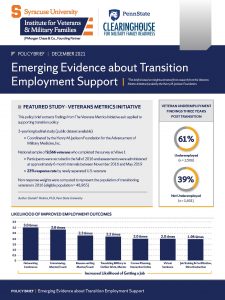Author: Daniel F. Perkins, Ph.D, Penn State University
This policy brief extracts findings from The Veterans Metrics Initiative as it applied to supporting transition policy 3-year longitudinal study (public dataset available).
—Coordinated by the Henry M. Jackson Foundation for the Advancement of Military Medicine, Inc.
A national sample of 9,566 veterans who completed the survey at Wave 1.
—Participants were recruited in the fall of 2016 and assessments were administered at approximately 6-month intervals between November 2016 and May 2019
—23% response rate by newly separated U.S. veterans
Non-response weights were computed to represent the population of transitioning veterans in 2016 (eligible population = 48,965)
Key Highlights
- 61% of veterans were underemployed after three years post-transition.
- Veterans of color were less likely to find a job 15 months post-separation than their white counterparts.
Why is this important?
Currently there are over 45 programs* across the federal government focused on employment transition support. This research puts measurement to the most effective types of employment interventions delivered by both government and nonprofit providers. Resources should be reviewed and redirected based on what evidence suggests is the most impactful.
*GAO report
Calls to Action:
- Congress should comprehensively examine current governmental programs designed to address veterans employment and underemployment. Assess programs’ utilization of evidence-based components as identified by TVMI.
- Congress should support existing legislation, such as HR 4769 the Onward to Opportunity Act – which directs Department of Defense resources towards successful employment transition models that include the components most likely to lead to positive employment/career outcomes.
*Likelihood of improved employment outcomes
- Networking conference – 3.0 times
- Interviewing, mentor/coach – 2.8 times
- Resume-writing, mentor/coach – 2.3 times
- Translating military to civilian work, mentor – 2.2 times
- Career planning, interactive online – 2.0 times
- Virtual Seminars – 2.0 times
- Job training & certification, direct instruction- 1.98 times


